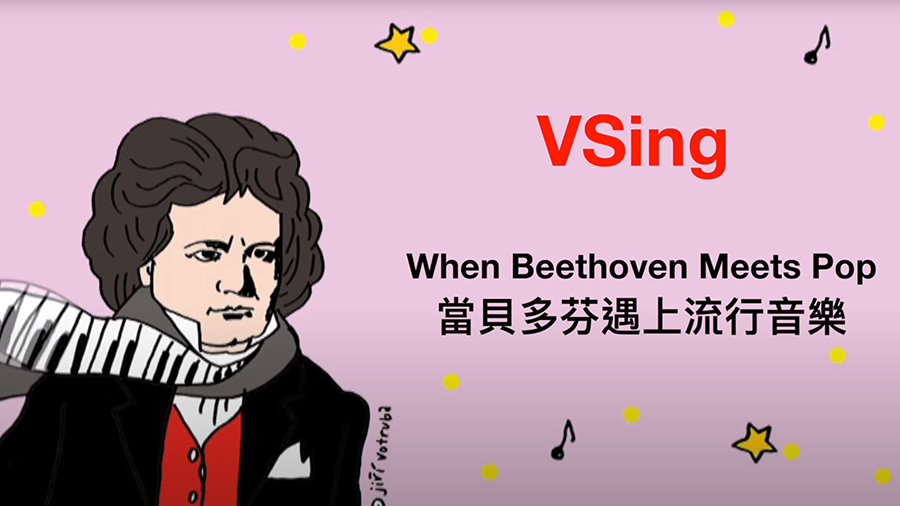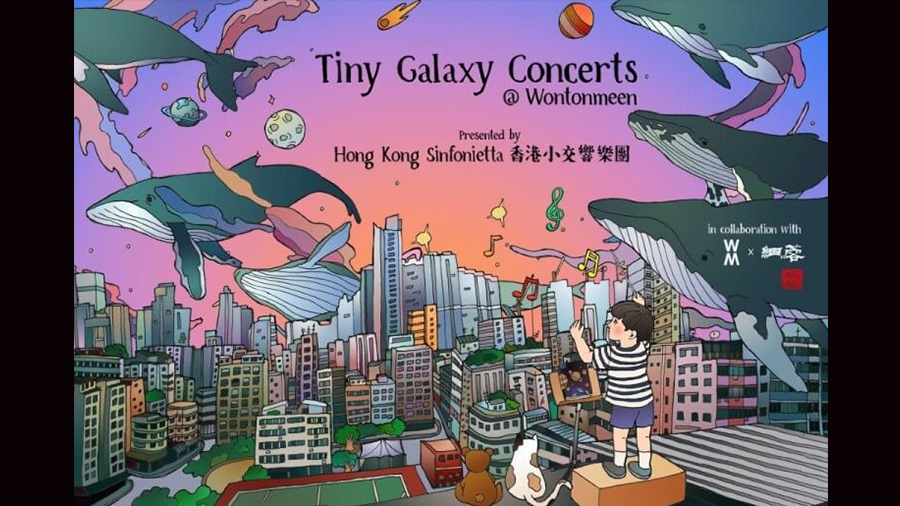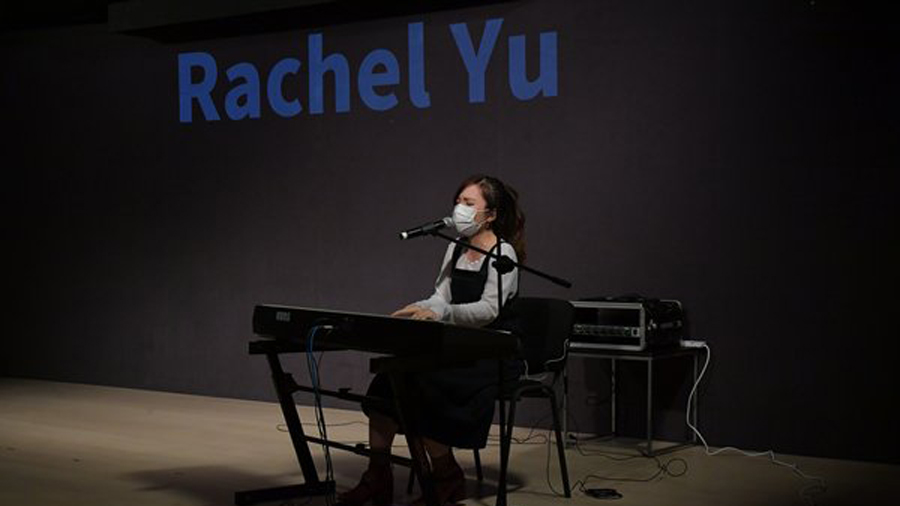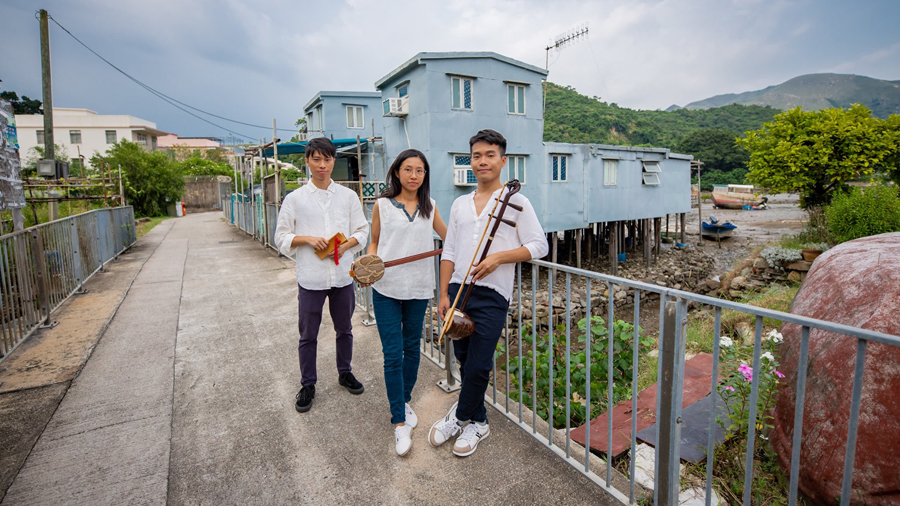#Music
Search Result: 5
VSing - When Beethoven Meets Pop
Local a cappella group VSing shares with us their energetic and captivating mashup of Cantopop songs based on Beethoven’s timeless masterpieces. How many Beethoven-inspired pop songs can you name? For more details, please visit the Hong Kong Sinfonietta website.
Journey through a mesmerising musical galaxy online - “Tiny Galaxy Concerts @ Wontonmeen”
Hong Kong Sinfonietta presents “Tiny Galaxy Concerts @ Wontonmeen” – an online chamber concert series curated in collaboration with Wontonmeen – a hostel located in the vibrant and historical neighbourhood of Sham Shui Po. Explore with your eyes, ears and heart the beauty of where hand-picked gems of chamber music collide with the sentiments and quintessence of an old Hong Kong. Leave behind all expectations, and enter this imaginative space with the musicians – and enter the precious, mesmerising, wondrously tiny musical galaxy! The first episode Features Bartók’s stimulating, folk-inspired Contrasts, performed by Concertmaster James Cuddeford, Principal Clarinet Fong Hiu-kai Johnny and pianist Colleen Lee (HKS Artist Associate 2010-2011). The second episode Focuses on the sparkling music of Mendelssohn, as pianist Colleen Lee plays a couple of Songs Without Words, and clarinettists Fong Hiu-kai Johnny and Chen Chiu-yuan play the Concert Piece No 2 in D minor with pianist Li Hau-ling Jacqueline. The third episode Beethoven "Trio for Piano, Violin & Cello in B-flat, WoO 39"Violin: James Cuddeford /Cello: Aurélien Pascal /Piano: Perry SoBartók/Szigeti "Hungarian Folk Tunes"Violin: James Cuddeford /Piano: Perry SoSchnittke "Silent Night for Violin & Piano (1978)"Violin: James Cuddeford /Piano: Perry So The fourth episode James Cuddeford “For the Five Fingers” from Four Studies for a Portrait of Roger Smalley (world première)Piano: Colleen Lee (HKS Artist Associate 2010-2011)Roger Smalley "Suite for 2 Violins (2006)"Violin: James Cuddeford, Le Hoai-nam For more details, please visit the Hong Kong Sinfonietta website.
Music talent hits the main stage
(The photo is provided by Information Services Department) "My Main Stage" Music Production Pilot Programme is a part of the Leisure & Cultural Services Department’s 2019-20 General Education in Arts Programme for tertiary students. Launched in September last year, its goal is to nurture a new generation of aspiring music talent.Mastering musicThe pilot programme’s founder Chiu Tsang-hei mobilised other music and songwriting professionals in the industry, like Eric Kwok and Chan Wing-him, to offer students advice. “I started the My Main Stage Music Production Pilot Programme three to four years ago. It was intended to hunt for potential music talent in secondary schools and prepare them for a career in the music industry. “The Leisure & Cultural Services Department suggested that I should expand the programme to tertiary institutes. So the pilot programme was included in the General Education in Arts Programme for tertiary students last year.” He explained that the assistance from the Government is crucial. It saved him from having to liaise with different institutes and made the recruitment process simpler. The pilot programme comprises a series of workshops, masterclasses, production coaching and performances aimed at elevating students’ music production skills. (The photo is provided by Information Services Department) Rachel Yu studied music at her university due to her passion for music as a youngster. Inspired by the touring talks held by eminent music producer and composer Chiu Tsang-hei, she entered the My Main Stage Music Production Pilot Programme early this year. “I joined this programme because I wanted to seek professional advice from very experienced tutors, for example, in writing lyrics, composing or music production. I wanted to polish up my musical skills,” said Rachel. In an achievement that took almost a year of hard work under the guidance of local music professionals, Rachel was able to produce the best version of her very own song.Coaching onlineFaced with the COVID-19 epidemic, Chiu said technology has played a vital role in making it possible for him to communicate with students while practising social distancing. He has made good use of video conferencing software and online teaching technology to stay in touch with students. “It enabled me to provide them with comments and critiques after I listened to their songs. It was just as easy for them to send their revised work back to me. “I could also use emails and other tech tools to help me so I didn’t have to rely on face-to-face teaching.” Rachel said Chiu’s support is invaluable as he has enlightened her on improving her vocals. “At first, I sang very badly but he forced me to practise every day. Every day I sent him a music demo of me practising the song. “For more than two weeks, I kept practising the song and my performance got better. When I recorded the vocal part, it was a lot better than before.” Trustworthy programmeAnother participant, Bu Yu, described the programme as a trusted platform to learn from local music professionals. “We did not have the chance to learn pop music production in secondary schools. We could only enrol in music school classes on the market. “Such classes may not be reliable and the teaching quality is not guaranteed. So I could only learn music production by myself before I joined the programme,” said Bu. One of the tutors is Arnold Chan who believes the pilot programme is a rare opportunity for students to learn as much as they can about music production in about a year. “I know a lot about the technical aspects of music production, for example, the mixing and recording process, compression, EQ - which is equalisation skills - and some balance skills. “The students would have to spend a lot of time if they had to learn these skills by themselves from the Internet and they may have some problem-solving issues that require help from us.” Arnold’s advice to students is to seize every opportunity to explore all aspects of music production if they truly want to excel in the music industry. “For top singer-songwriters and producers these days, they have to do all kinds of jobs. So I think they have to grasp as much experience as they can to try to meet professional standards.” (Information provided by Information Services Department)
Singing Nanyin as We Go @ Tai O
Singing Nanyin as We Go @ Tai O A song art sung in the Cantonese vernacular, nanyin was a kind of popular entertainment for the people of Hong Kong. Nanyin was mostly sung by blind artistes, accompanied by zheng and yehu, and to the rhythm given by clappers. The lyrics often reflected the living hardships of the lowest stratum of society. Today, it has become part of our intangible cultural heritage and was inscribed onto the first Representative List of the Intangible Cultural Heritage of Hong Kong. it was once a popular form of entertainment in Hong Kong during the early 20th century. The Intangible Cultural Heritage Office invited the troupe group "The Gong Strikes One" to tour Hong Kong's 18 districts and use nanyin to recount the history of local communities and to bring in-depth cultural insights. Below is the performance of the tour in Lautau Island, Tai O. To watch more about "Singing Nanyin", please visit the website of the Intangible Cultural Heritage Office.
【Classic】Listen to "Prelude of Dagger Society" (Soundtrack from the movie Buddha's Palm)
Prelude of Dagger Society (Soundtrack from the movie Buddha's Palm) Shang Yi Special thanks: HKCO










